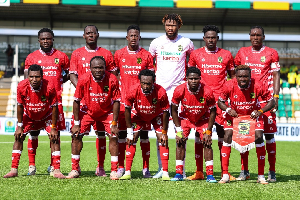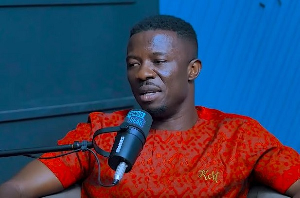Pierre Ankomah knew early on that he wanted more from his education. As a boarding school student in his native Ghana, he realized that his studies lacked the breadth that he craved.
When it came time to make a choice about college, Pierre decided that an American liberal arts college was exactly what he was looking for. "If I had gone to school in Ghana or Europe, I would have gone straight into a specialty, such as medicine or law," he explained. "At that point, I knew that I wanted to learn more. I had an interest in history, music, and writing, as well as a strong interest in science. I knew that the liberal arts system would give me the opportunity to explore different avenues of knowledge."
His decision has proved to be a sound one. Four years after arriving on the Franklin & Marshall campus, the biochemistry and molecular biology major has received Franklin & Marshall's highest student honor--the Williamson Medal.
The Williamson Medal, is the college's most prestigious student award, is given each year at Commencement to a deserving senior who "has reached the highest standing in character, leadership, and scholarship." The medal was endowed in memory of the late Henry S. Williamson, a Lancaster businessman and a member of the Franklin & Marshall board of trustees for many years.
Ankomah is the 86th recipient of the medal.
Ankomah vividly remembers the moment he arrived in Lancaster. "I just took a deep breath of air and thought to myself, 'I hope that after four years, I will have represented myself, my family, and my country well.'"
According to Ankomah, he plunged headfirst into all that the liberal arts had to offer. Although he had an inkling that he was headed for a career in the natural sciences, during his first semester he took just one science class.
"I think that during my first two years, the curriculum here helped me to explore many things," he recalls. "I had to do a lot of intellectual exercises that involved many disciplines. I was able to take classes in the social sciences, economics, as well as the physical sciences. In fact, although I am graduating as a biochemist, I really believe that I am leaving Franklin & Marshall with a major in liberal arts. What is great about this system is that it teaches you about possibilities."
Realizing those possibilities is what vaulted Ankomah to the top of his class. His citation
One such interaction came when he served as a preceptor in Prof. Phyllis Leber's chemistry course. Ankomah says that this is when he discovered he had a passion for teaching.
"I had to help students work with concepts that would be worth finding and help them to make linkages to applications that Dr. Leber was teaching. There was no better feeling than seeing the light bulb go off above someone's head and knowing that I had something to do with it," he enthuses.
Ankomah then moved on to a project with chemistry professor Ed Fenlon, spending a summer trying to synthesize a polyethylene trefoil knot. He learned disappointment that summer when he and Fenlon came to the conclusion that their initial approach was not going to work. But, he also learned another lesson. "I found that despite the initial failure, I was able to rise above that and work with Dr. Fenlon to reinvent our approach to the problem," he says.
When the summer was over, he moved on to another of Fenlon's projects, exploring a pathbreaking technique in which nuclear probes are used as reporters for measuring electric fields in nucleic acids. Says Fenlon, "This hardworking, dedicated and talented researcher holds great promise as a scientist."
As for Ankomah, he was most gratified by Fenlon's confidence in him. "I think that after a time, I ceased to be a student in his lab and we indeed became colleagues. That gave me an amazing sense of confidence in my own abilities. The mix of guidance and independence Dr. Fenlon provided me allowed me to make the most of my experience."
However, it was Ankomah's Global Scholar project during his junior year that cemented his decision to choose health care as his career. Thinking it "proper" to use his scholarship on a project that would have global implications, he opted to do work in Ghana studying the specifics of condom use among commercial sex workers and the possible effect on the spread of HIV/AIDS in his home country.
He began the project with a traditional research bent, believing that he could set up experiments, conduct interviews, analyze data, and come to conclusions.
"I could not have been more wrong," he says with a smile. "Probably the biggest lesson of all was that the field requires a great deal of creativity (much, much more than I initially supposed). I found out that you need to build trust and respect with your subjects before you can ask them certain questions. What this project underscored for me was that healing is a multi-faceted process and that I want to be part of that process in as many ways as I can. Hence, my decision to become a physician/scientist who can work simultaneously in a hospital and a laboratory, do translational research, and see how my research is impacting real people."
Associate Dean of the Faculty Dick Fluck, who advised Ankomah on this project, agrees. "Pierre understands that the global AIDS epidemic is as much about sociology and public policy as it is about the molecular genetics of the virus that causes AIDS. His fieldwork in Kumasi, Ghana, will make him a better physician and scientist."
It is this awareness of the multi-faceted approach to his chosen vocation that validates Ankomah's decision to study at a liberal arts institution. It is one of the reasons he was chosen to receive the Williamson medal. However, Ankomah believes that his "entire class has changed the face of the campus" during its four years on campus. "I am just a representative," he says humbly. "Receiving this honor shows me the extent of what I have been given, and reiterates for me that I could, and should give back to society."
Ankomah, an Honors List student and summa cum laude graduate, graduates with a perfect 4.0 GPA. A Hackman Scholar, Dana Scholar and Global Scholar, he earned seven academic prizes (including the Rawnsley Science Prize which is given to the outstanding senior in all the science departments) and is a member of three honor societies, including Phi Beta Kappa. He will continue his studies next year as an M.D./Ph.D. candidate at Emory University.
A 2003 graduate of Prempeh College, Ankomah is the son of Harriet Takyi, Sunyani, Ghana.
Diaspora News of Saturday, 26 May 2007
Source: http://www.fandm.edu/x14808.xml












